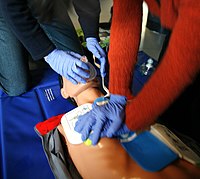
Photo from wikipedia
Supplemental Digital Content is available in the text. Objectives: To examine adverse events and associated factors and outcomes during transition from ICU to hospital ward (after ICU discharge). Design: Multicenter… Click to show full abstract
Supplemental Digital Content is available in the text. Objectives: To examine adverse events and associated factors and outcomes during transition from ICU to hospital ward (after ICU discharge). Design: Multicenter cohort study. Setting: Ten adult medical-surgical Canadian ICUs. Patients: Patients were those admitted to one of the 10 ICUs from July 2014 to January 2016. Interventions: None. Measurements and Main Results: Two ICU physicians independently reviewed progress and consultation notes documented in the medical record within 7 days of patient’s ICU discharge date to identify and classify adverse events. The adverse event data were linked to patient characteristics and ICU and ward physician surveys collected during the larger prospective cohort study. Analyses were conducted using multivariable logistic regression. Of the 451 patients included in the study, 84 (19%) experienced an adverse event, the majority (62%) within 3 days of transfer from ICU to hospital ward. Most adverse events resulted only in symptoms (77%) and 36% were judged to be preventable. Patients with adverse events were more likely to be readmitted to the ICU (odds ratio, 5.5; 95% CI, 2.4–13.0), have a longer hospital stay (mean difference, 16.1 d; 95% CI, 8.4–23.7) or die in hospital (odds ratio, 4.6; 95% CI, 1.8-11.8) than those without an adverse event. ICU and ward physician predictions at the time of ICU discharge had low sensitivity and specificity for predicting adverse events, ICU readmissions, and hospital death. Conclusions: Adverse events are common after ICU discharge to hospital ward and are associated with ICU readmission, increased hospital length of stay and death and are not predicted by ICU or ward physicians.
Journal Title: Critical Care Medicine
Year Published: 2020
Link to full text (if available)
Share on Social Media: Sign Up to like & get
recommendations!